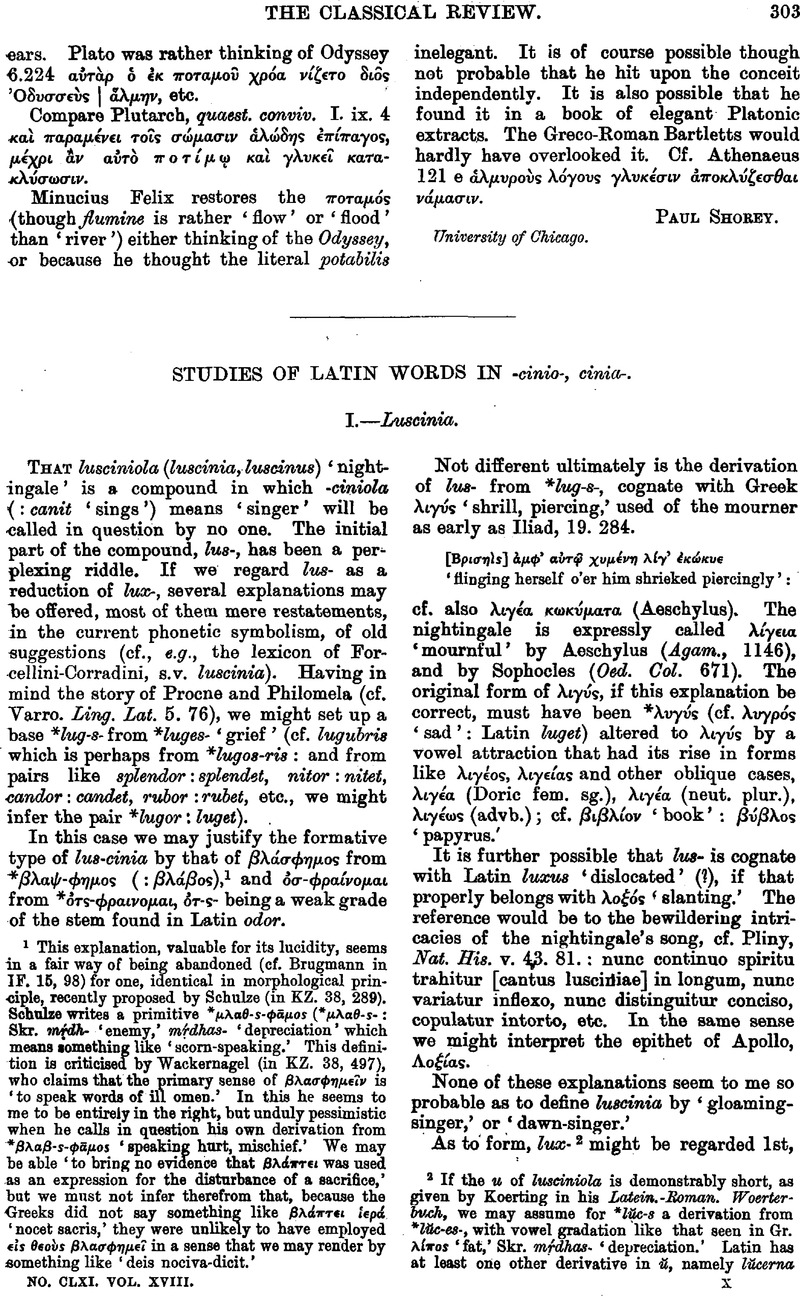No CrossRef data available.
Article contents
Studies of Latin Words in -cinio-, cinia-
Published online by Cambridge University Press: 27 October 2009
Abstract

- Type
- Original Contributions
- Information
- Copyright
- Copyright © The Classical Association 1904
References
page 303 note 1 This explanation, valuable for its lucidity, seems in a fair way of being abandoned (cf. Brugmann in 1F. 15, 98) for one, identical in morphological principle, recently proposed by Schulze (in KZ. 38, 289). Schulze writes a primitive ![]() (*μλαθ-ς-: Skr.mṛdh- ‘enemy,’ mṛdhas- ‘depreciation’ which means something like ‘scorn-speaking.’ This definition is criticised by Wackernagel (in KZ. 38, 497), who claims that the primary sense of
(*μλαθ-ς-: Skr.mṛdh- ‘enemy,’ mṛdhas- ‘depreciation’ which means something like ‘scorn-speaking.’ This definition is criticised by Wackernagel (in KZ. 38, 497), who claims that the primary sense of ![]() is ‘to speak words of ill omen.’ In this he seems to me to be entirely in the right, but unduly pessimistic when he calls in question his own derivation from
is ‘to speak words of ill omen.’ In this he seems to me to be entirely in the right, but unduly pessimistic when he calls in question his own derivation from ![]() ‘speaking hurt, mischief.’ We may be able ‘to bring no evidence that βλ⋯πτει was used as an expression for the disturbance of a sacrifice,’ but we must not infer therefrom that, because the Greeks did not say something like βλ⋯πτει ἱερ⋯ ‘nocet sacris,’ they were unlikely to have employed εἰς θεοὺς βλασφημεῖ in a sense that we may render something like ‘deis nociva-dicit.’
‘speaking hurt, mischief.’ We may be able ‘to bring no evidence that βλ⋯πτει was used as an expression for the disturbance of a sacrifice,’ but we must not infer therefrom that, because the Greeks did not say something like βλ⋯πτει ἱερ⋯ ‘nocet sacris,’ they were unlikely to have employed εἰς θεοὺς βλασφημεῖ in a sense that we may render something like ‘deis nociva-dicit.’
page 303 note 2 If the u of lusciniola is demonstrably short, as given by Koerting in his Latein.-Roman. Woerter-buch, we may assume for *lŭc-s a derivation from *lŭc-es-, with vowel gradation like that seen in Gr. λ⋯πος ‘fat,’ Skr. mŕdhas- ‘depreciation.’ Latin has at least one other derivative in ŭ, namely lŭcerna ‘lamp,’ which derives, as I may suggest in passing, from *lu[ci-]cerna ‘light-horn (cf. the spelling lanthorn for English lantern), light-basin,’ with the stems exhibited in Skr. rúci- (rucí-) ‘light’ and Greek κ⋯ρνος ‘basin, dish.’ The suffix of lucerna has affected the borrowed Greek word λαμπτ⋯ρ, yielding lanterna. But the quasi-suffix -erna is of no wide extension. If we may combine Ennius's examples caua caerula (Trag. 332), caua caeli (ib. 131) ‘the blue vault of heaven’ with Lucretius's caeli cauenae (4. 171), cauernae aetheriae (4. 391) we might derive cauerna ‘vault’ from *ca[uo-]uerna (: Skr. várnas ‘cover’) ‘having a vaulted cover.’ The suffix abstracted from cau-erna may well have played a part in the suffix finally developed for taberna (lately discussed by Solmsen, KZ. 38. 456) and cisterna—[cf. cornu ‘lantern’ in Amph. 341].
page 304 note 1 I can see no reason for deriving νμκτ⋯ς from *nokl⋯s that would not demand *ὐκτώ in place of *⋯κτώ(: Skr. astā). All Hirt's examples (Griech. Gram. § 108) fail to convince. Several of the cases are better explained by Brugmann (Gr. Gram.3 § 66, 1); no cogency attaches to μ⋯ρμηξ Hesychian β⋯ρμαξ(: Lat. formica (cf. Joh. Schmidt, Sonantentheorie, p. 29 and Brugmann, l.c. § 122). This leaves over, besides ν⋯ξ, assimilated, as I have suggested, to λυκ- (cf. Skr. rúc- ‘gleam’), only ⋯νμξ ‘hoof, claw, nail.’ To derive the υ of ⋯νμξ from an ο is a pure exercise of volition. A final explanation of this -μ- we may never reach; provisionally, in view of Hesiod's χθ⋯να ν⋯σσειν χηλησι ‘to claw the ground with hoofs,’ we may suppose a popular (or genuine?) cognation between ν⋯σσει and ὔνμξ, and if we do not know the origin of ν⋯σσε ‘tears, pricks’ its -υ- is saved from phonetic challenge by the rhyme word ⋯μ⋯σσει ‘tears, scratches,’ whether we suppose the υ to be original, or whether we suppose ν⋯σσει, before it affected the vowel colour of ⋯νμξ, to have got its own vowel colour from ⋯μ⋯σσει (cf. for the u Lat. muc-ro ‘point, blade’).
page 305 note 1 By Wordsworth ascribed to Chaucer, but see Skeat's Chaucerian and Other Pieces, p. lvii.
page 306 note 1 Here we may compare the following from Mr.Jackson's, A. V. William ‘By Caravan and Cavalcade’ (N.Y. Evening Post, Semiweekly, Oct. 5, 1903)Google Scholar:
‘The gray streaks of dawn now lighten in the horizon. The sky takes on a more silvery hue. Night withdraws her star-bespangled fan and reveals the blush of dawn. The nightingale's song is hushed before the carol of the lark. And out of the cavern of the hills the sun rises in splendour to shed its glory as of old over the ancient land of Iran.’
page 306 note 2 Wordsworth's version has been cited above to the same effect, and the original need not be excerpted here.


